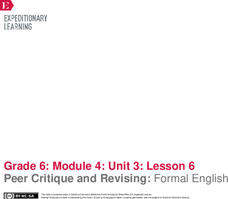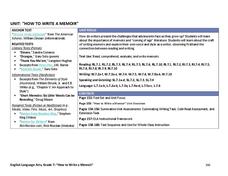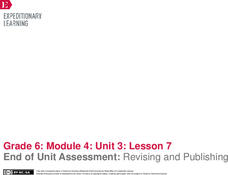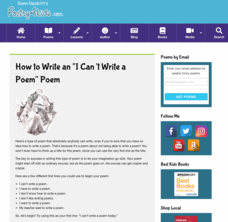EngageNY
Peer Critique and Revising: Formal English
Dear Sir or Madam: What's the difference between formal and informal language? Scholars focus on using formal English and transitions in their position papers. After revising their rough drafts, they engage in the peer editing process...
Louisiana Department of Education
How to Write a Memoir
Who are we and what shapes our identities? Seventh graders work to answer this question as they learn how to write a memoir. Full of non-print resources and supplemental texts that range from fiction to non-fiction, scholars write their...
EngageNY
Performance Task Preparation: Peer Critique and Mini-Lesson Addressing Common Errors: Revising Draft Essay to Inform
Time to revise! Using a writing evaluation rubric, scholars participate in a peer editing process to provide feedback on each others' informative essays. Next, pupils begin revising their drafts based on the feedback they receive.
EngageNY
End of Unit Assessment: Revising and Publishing
Dictionaries, thesauruses, word walls, oh my! Pupils use several resources to revise their position papers to include appropriate vocabulary. Then, after peer editing, scholars write the final drafts of their essays and self-assess using...
EngageNY
Mid-Unit Assessment: Completing My Draft Position Paper
What's the difference? Scholars analyze the similarities and differences between introductory and concluding paragraphs. Then, using a model essay as a guide, they write their draft position papers.
Poetry4kids
How to Write a Traditional “Mother Goose” Nursery Rhyme
There may be some little lambs, itsy bitsy spiders, and pumpkin eaters in your language arts class! An online poetry lesson takes learners through the steps of writing a nursery rhyme with easy-to-follow steps and explanatory examples.
21 x 20 Media
A+ Writing Prompts
Shake it up! Shake your tablet to bring up a unique writing prompt for journaling or blogging with your class. Shake again and a new one appears. Prompts can come from different categories (sketches, scenes, texts, words, news) to help...
Poetry4kids
How to Write an “I Can’t Write a Poem” Poem
Ever have students complain that they don't know how to write a poem? Turn those complaints into magnificent works of writing with an independent poetry lesson about not being able to write poetry.
Automattic
365 Days of Writing Prompts
"If you could un-invent something what would it be?" "What are you more comfortable with—routine or spontaneity?" Here's a packet of one-a-day writing prompts. Although designed for fifth graders, the topics are appropriate for any grade...
ReadWriteThink
Dear Librarian: Writing a Persuasive Letter
Everyone deserves to read a great book! Here, pupils write a persuasive letter to the school's librarian detailing their favorite story and why it should be found on the shelves. Class members' persuasive reading passages are shared with...
University of Houston
Personal Narratives: Writing, Revising, and Publishing (WRAP)
Writing is a process, and lesson planning is, too! A personal narrative unit stresses the writing process to pupils, who first examine various stories and poems as a model of autobiographical writing and then write their own stories....
Poetry4kids
How to Write Funny Poetry — Chapter 1: Writing Poetry
Do you wish you could write poetry that makes people laugh? Now you can! Check out the first chapter in a poetry writing series that emphasizes the importance of connecting subject matter to a light, bouncy meter.
Poetry4kids
How to Write Funny Poetry — Chapter 3: Choosing a Topic
Nothing's better than a really funny poem! Help young writers craft their funny poems with a lesson on one of the most challenging parts of writing: picking what to write about.
Poetry4kids
How to Write an Exaggeration Poem
The best poetry writing lesson of all time is here for you! Learn all about the art of exaggeration with a lesson on exaggeration poems, which instructs students to use wild imagery to convey their message.
Curated OER
Revision Checklist for the Accordion Essay
Encourage your class to revise their writing and check over their work by requiring them to complete an organization checklist. The checklist, created specifically for a accordion-style essay, asks writers to look over their formatting,...
The New York Times
I Don’t Think So: Writing Effective Counterarguments
When it comes to writing effective arguments, writers must do more than simply make a claim, counterarguments must be considered. Aspiring writers analyze counterarguments in editorials, and then learn how to write counterarguments in...
Poetry4kids
How to Write a Clerihew
Writing funny poems is the best part about learning poetic forms! Young poets learn all about clerihews—humorous four-line poems about people—with an explanatory lesson.
Massachusetts Institute of Technology
Sentence Structure of Technical Writing
Most teachers and scholars look for a way to simplify information. Informational how-to slides simplify the process of technical writing into a step-by-step process. Learners gather information on what to do, as well as what to avoid....
Anchorage School District
Writing Reference Sheet
Print out this handy reference page double sided and distribute it to your class. Individuals can use the page to aid them as they work on their topic sentences, transitions, conclusions, and paragraph structure. There is plenty of...
Prestwick House
Writing Arguments in Response to Nonfiction
Emotional appeal or argument? That is the question. An informative lesson helps your class recognize the difference between a logical argument and an emotional appeal and learn how to craft an argumentative response. Writers develop a...
Poetry4kids
How to Write a Concrete or “Shape” Poem
Writers compose an original shape poem. Scholars choose a subject to write about and create a visual representation by forming a corresponding picture using the poem's words.
Poetry4kids
How to Write a Fractured Nursery Rhyme
Scholars take a popular song or nursery rhyme and make it their own as they write a fractured nursery rhyme. Writers seek out a nursery rhyme's rhyming words and change them to create an original poem.
Poetry4kids
How to Write a Diamante Poem
A lesson begins with a description of a diamante poem and the rules to follow while writing one. Scholars examine the ins and outs of synonym and antonym diamantes, then compose an original poem using their newfound knowledge.
EngageNY
End of Unit 2 Assessment, Part 2: Revise Essay Drafts
Time to revise! Scholars revise their argument essays based on Shakespeare's A Midsummer Night's Dream using feedback from their teacher and peers. They begin their revisions after reviewing a mini-lesson on proper writing conventions.
Other popular searches
- English Writing Skills
- English Writing Narratives
- Writing in High School English
- Business English Writing
- Writing Plays English
- English Writing a Paragraph
- Writing in English Class
- English Writing Persuasion
- English Writing a Poem
- English Writing Instruction
- Esl English Writing
- Writing English

























